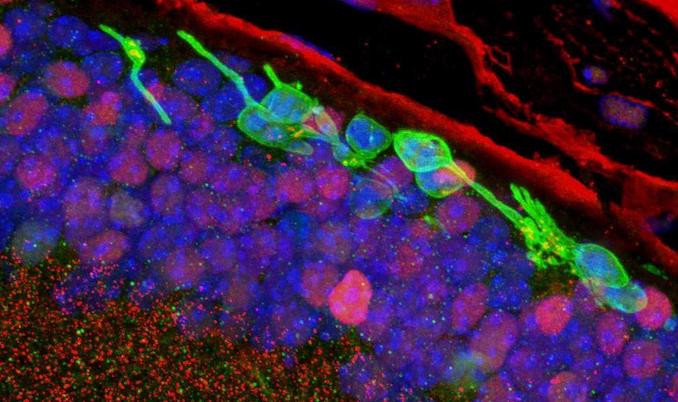Until now, in their laboratory experiences with animals, researchers have replaced dying photoreceptors by creating new stem cells from cells in the skin or the blood system, and programming them to become photoreceptors, which are then transplanted into the body. retina. In this new study that I share with you today, scientists show that it is possible to skip the intermediate step of stem cells and directly reprogram skin cells into photoreceptors.
«This is the first study to show that direct chemical reprogramming can produce cells similar to those of the retina, in particular rod-like photoreceptors, which opens the door to a new and faster strategy to develop therapies for age-related macular degeneration and other disorders of the retina caused by loss of photoreceptors, ”said Anand Swaroop, Ph.D., principal investigator at the NEI Neurobiology, Neurodegeneration, and Repair Laboratory.
‘The immediate benefit of this discovery will be the ability to rapidly model the disease and its variants, and thus be able to study the mechanisms that produce it. The new strategy will also help us design better approaches to its cell replacement therapy. ‘
Scientists have studied “induced pluripotent stem (iPS)” with great interest over the past decade. IPS are developed in a laboratory from adult cells, rather than fetal tissue, and can be used to produce almost any type of replacement cell or tissue. But iPS cell reprogramming protocols can take up to six months before cells or tissues are ready for transplantation. In contrast, the direct reprogramming described in this new study succeeded in turning skin cells into functional photoreceptors ready for transplantation in just 10 days. The researchers confirmed the good performance of their technique in mouse eyes, using skin cells obtained from mice and humans.
«Our technique goes directly from the skin cell to the photoreceptor without the need to go through stem cells, ”said the study’s principal investigator, Sai Chavala, MD, CEO and president of CIRC Therapeutics and the Center for Retina Innovation.
The direct reprogramming technique involves bathing skin cells in a cocktail of five smaller molecule compounds that together chemically act on the relevant molecular pathways to give rise to a rod-like photoreceptor cell. The result is rod photoreceptors that mimic native rods in appearance and function.
The researchers performed gene expression profiles, which showed that the genes in the new cells were similar to those in real rod photoreceptors. At the same time, genes relevant to skin cell function had been negatively modified to obviate their original function.
The researchers transplanted these new cells into mice with macular degeneration and then tested their pupillary reflexes, a test that allows to verify the function of the photoreceptor after transplantation. In low light conditions, the constriction of the pupil depends on the function of the rod-like photoreceptors. One month after transplantation, 43% (6 of 14) of the animals showed a robust pupillary constriction in low light conditions compared to none of the untreated controls.
In addition, treated mice that had a robust response to their pupillary constriction were more likely to seek and spend time in dark spaces compared to treated mice, but no pupillary response, and control (untreated) mice. The preference for dark spaces is a behavior that requires good vision and reflects the natural tendency of mice to seek safe, dark places rather than light ones.
‘Even mice with severe and advanced macular degeneration, with little chance of having living photoreceptors, responded positively to transplantation. Such findings suggest that the observed improvements were due to laboratory-made photoreceptors and not a beneficial effect of treatment on the health and function of existing photoreceptors, “said study first author Biraj Mahato, Ph.D. , research scientist, UNTHSC.
Three months after transplantation, immunofluorescence studies confirmed the survival of laboratory photoreceptors, as well as the existence of synaptic connections with neurons in the retina.
‘Importantly, the researchers discovered how this direct reprogramming is managed at the cellular level. This discovery will help researchers apply the technique not only to cells in the retina, but to many other types of cells, ”Swaroop said.
“If the efficiency of this direct conversion can be improved, this can significantly reduce the time it takes to develop a potential cell therapy product“Said Kapil Bharti, Ph.D., Principal Investigator and Chief of the Ocular and Stem Cell Translational Research Section at NEI.
Source: Researchers restore sight in mice by turning skin cells into light-sensing eye cells
Photo credits: Sai Chavala, MD “Three months after transplantation, immunofluorescence studies confirmed the survival of the chemically induced photoreceptor-like cells (green)”
Glasses Online
Glasses Online offer top quality designer glasses all at special prices. British designed frame styles each with a choice of FREE LENSES to your prescription and more complex lenses at low cost. Essilor Varilux lenses, thin lenses, Transitions lenses are all at prices not seen on the high street.
Our range includes
- Aspinal Of London Glasses
- Basebox Glasses
- Cocoa Mint Glasses
- Eco-Conscious Glasses
- Jensen Glasses
- Land Rover Glasses
- Louis Marcel Glasses
- Range Rover Glasses
- Zips Glasses
Final Thoughts
If you’re in the market for a new pair of glasses, then look no further than Qualite Glasses. We offer free lenses with frames and only carry top quality designer brands like Aspinal Of London, Basebox, Cocoa Mint and Range Rover. All our eyewear is made to order so if there’s something specific that you need or want but can’t find on our site just let us know! With unbeatable prices and expert customer service, it doesn’t get any better than this when shopping online for your next purchase of glasses. If all of this sounds too good to be true (and we bet it does), don’t worry about anything – we have an iron-clad money-back guarantee that ensures complete satisfaction.

